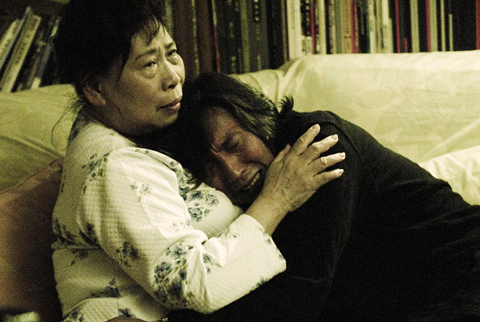A disciple of Taiwanese New Wave cinema and a sought-after director of television soap operas, Niu Chen-zer (鈕承澤) felt the urge to direct his debut feature film when approaching 40.
The result is What On Earth Have I Done Wrong?! (情非得已之生存之道), a film about making a film that won the Fipresci prize at last year’s Golden Horse Awards (金馬獎) for Chinese-language films and the Netpac award at International Film Festival Rotterdam this year.
The movie opens with Niu becoming inspired to make a mockumentary that satirizes local politicians. After securing a government subsidy to produce the film, the aspiring director assembles a production crew and a savvy producer to track down the extra money needed to complete the movie.

PHOTO COURTESY OF HONTO PRODUCTION
Like many filmmakers in Taiwan, Niu quickly finds out that scraping together enough cash is a mission impossible. Impetuous and frustrated, Niu gambles some of the government money on the stock market in the hope of winning big, courts gangsters, splurges on drugs, booze and prostitutes and pimps out his actresses to keep potential investors happy.
Meanwhile, Niu’s love life with actress Ning Ning (played by Chang Chun-ning (張鈞甯)) spins out of control because of his adultery and lying. The film gets off the ground but is diverted from its original course to become a wild self-portrait of the director.
With a deliberately low-budget, hand-held documentary look, the film offers voyeuristic pleasure by probing the grimier aspects of filmmaking and presenting the bold self-confession of Niu as a filmmaker who is willing to resort to any means to attain his goal.

PHOTO COURTESY OF HONTO PRODUCTION
The movie’s attraction lies in its guileful fusion of the fictional and the real. The illusion of documentary is maintained by interviews with such public figures as Chinese Nationalist Party (KMT) Legislator Chiu Yi (邱毅), shots of the fugitive former Rebar Group chairman Wang You-theng (王又曾) before he fled the country, as well as deadpan supporting cast members playing themselves.
Niu’s ability to laugh at himself infuses the film with plenty of funny moments. Just when members of the audience feel settled down to see the work as a self-portrait of a director charmingly grumbling over his trade and the moral predicaments he faces, the film takes a melodramatic turn, which shan’t be divulged here.
Though this exercise in self-reflexivity is prone to self-indulgence, with a sharp script, natural acting abilities of its cast and the actor-turned-director’s own charisma, What on Earth Have I Done Wrong?! is an enjoyable cinematic outing.

As I finally slid into the warm embrace of the hot, clifftop pool, it was a serene moment of reflection. The sound of the river reflected off the cave walls, the white of our camping lights reflected off the dark, shimmering surface of the water, and I reflected on how fortunate I was to be here. After all, the beautiful walk through narrow canyons that had brought us here had been inaccessible for five years — and will be again soon. The day had started at the Huisun Forest Area (惠蓀林場), at the end of Nantou County Route 80, north and east

Specialty sandwiches loaded with the contents of an entire charcuterie board, overflowing with sauces, creams and all manner of creative add-ons, is perhaps one of the biggest global food trends of this year. From London to New York, lines form down the block for mortadella, burrata, pistachio and more stuffed between slices of fresh sourdough, rye or focaccia. To try the trend in Taipei, Munchies Mafia is for sure the spot — could this be the best sandwich in town? Carlos from Spain and Sergio from Mexico opened this spot just seven months ago. The two met working in the

Exceptions to the rule are sometimes revealing. For a brief few years, there was an emerging ideological split between the Democratic Progressive Party (DPP) and Chinese Nationalist Party (KMT) that appeared to be pushing the DPP in a direction that would be considered more liberal, and the KMT more conservative. In the previous column, “The KMT-DPP’s bureaucrat-led developmental state” (Dec. 11, page 12), we examined how Taiwan’s democratic system developed, and how both the two main parties largely accepted a similar consensus on how Taiwan should be run domestically and did not split along the left-right lines more familiar in

This month the government ordered a one-year block of Xiaohongshu (小紅書) or Rednote, a Chinese social media platform with more than 3 million users in Taiwan. The government pointed to widespread fraud activity on the platform, along with cybersecurity failures. Officials said that they had reached out to the company and asked it to change. However, they received no response. The pro-China parties, the Chinese Nationalist Party (KMT) and Taiwan People’s Party (TPP), immediately swung into action, denouncing the ban as an attack on free speech. This “free speech” claim was then echoed by the People’s Republic of China (PRC),